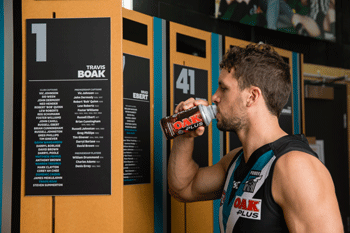Harry Routledge Port Adelaide Team Nutritionist Interview

Harry Routledge Port Adelaide Team Nutritionist Interview
Strong, tall and athletic, versus buff, bulk and fierce – there is a clear difference between the body type of an AFL player versus that of NRL. Every great sportsman, no matter the league or field position, has a regimented fitness timetable and meal plan designed closely in collaboration with an experienced nutritionist or dietitian.
According to Port Adelaide team nutritionist, Harry Routledge, every body type is different, and there are different processes one must take in order to achieve a desired look and feel – lean or buff.
To achieve the look of a lean AFL star, whilst still maintaining muscle tone and strength, Harry reveals the meal plan of Port Adelaide players, Travis Boak and Robbie Gray.
Breakfast
Protein oats and fruit – 31g protein, 28g carbs
Protein shakes (made with Chocolate OAK milk in lieu of plain white milk) with oats – 26g protein, 20g carbs
Cinnamon and banana pancakes – 36g protein, 31g carbs
Lunch
Steak and orange salad – 35g protein, 18g carbs
Salmon salad and sweet potato wedges – 25g protein, 15g carbs
Wholemeal chicken wraps – 22g protein, 32g carbs
Dinner
Chilli and spring onion turkey burgers with sweet potato wedges – 27g protein, 28g carbs
Steak and sweet potato wedges – 61g protein, 38g carbs
Greek chicken couscous salad – 38g protein, 57g carbs
OAK Chocolate milk – 11g protein, 33gm carbs
Harry says: 'The most important aspect of recovery is refuelling your body after a gruelling game or training session. The best food, whether that be for muscle gain or muscle recovery, is a high-quality protein source such as meat, fish, poultry or dairy, paired with a quality carbohydrate source."
Chocolate OAK is high in protein and carbohydrates, making it an ideal post-game or workout recovery drink.
Harry says OAK Chocolate milk can be a good alternative to protein shakes.
'When you exercise you deplete your body's glycogen and damage your muscle fibres. The protein and carbohydrate content in OAK Chocolate Milk helps to replenish those lost glycogen stores and repair your muscle fibres so your body recovers quickly."
Robbie Gray's recommended fitness workout to achieve the body of an AFL forward:
3 x 8 100m runs in 20 seconds with 20 second rest
Agility running drills, 4x4 efforts 30s between efforts
2 sets x 6 30m sprints (starting on each 60 second)
3 sets x 8 50m sprints, on every 30 seconds (look to achieve this in less than 8 seconds, on every 30 seconds
Take 2 minutes rest between each exercise/drill
Travis Boak's recommended fitness workout to achieve the body of an AFL midfielder:
3 x8 100m runs in 20 seconds with 20second rest
Agility running drills 4x4 efforts 30s between efforts
3 sets x 8 50m sprints, on every 30 seconds (start in push up position each rep)
6 reps x 20 second max distance runs with 90 seconds jog between each rep
Take 2 minutes rest between each exercise/drill
 Interview with Harry Routledge
Interview with Harry Routledge
Question: How important is what AFL players eat, to building their strong, tall and athletic physique?
Harry Routledge: Nutrition is a part of the jigsaw of elite performance that is as important as any other aspect of training and lifestyle. The focus of nutrition for AFL player is fuelling the body to perform, encompassing a nutritional strategy to prepare the body optimally to play AFL football. For us to achieve an AFL playing squad who are in an optimal physical condition to perform to the highest-level, nutrition plays an essential part in ensuring players are lean, high in muscle mass and carrying low amounts of body fat.
Question: How often do you change a Port Adelaide player's diet? And, how closely do you work with trainers when changing diets?
Harry Routledge: All the player's diets are tailored to their individual needs and taste preferences. To ensure we are optimally fuelling the players, their diet will change daily dependent upon the training or game load of the specific day. Therefore, working closely with the Head of Performance is imperative to ensure that the specifics of training or games are fully understood.
Question: What types of foods would your typical AFL player eat? How do these foods complement their training schedule?
Harry Routledge: AFL players consume a well-balanced diet with a manipulation of the main macronutrients (Carbohydrate, Protein, Fats) dependent upon the period of the season (Pre-Season v In Season). Due to the physical demands of AFL football, carbohydrates and protein become a focal point of a players diet especially around game day, to fuel the players to perform and aid in the recovery process. Immediately before a game the aim of nutrition is to provide a rapid increase in blood glucose levels for immediate use in the game. A way to increase this plasma glucose level is through glucose based lollies or drinks. Following an AFL game, players have depleted stores of muscle glycogen alongside muscle damage. To replenish these stores, a recovery shake containing quality amounts of carbohydrate and at least 20g protein, such as OAK Plus, can begin to start the recovery process. Players are then advised to consume a meal containing quality carbohydrate and protein such as chicken breast fillet on a wholemeal bun with baked sweet potato fries.
Question: How often does an AFL player's training schedule change?
Harry Routledge: AFL players schedule has two distinct phases (In Season v Pre-Season), which are noticeably different from each other. Pre-Season consists of a lot of
 conditioning work and coaches structures in preparation for the season, however in season is more of tactical and preparation for games. Due to these distinct differences, there is an altered nutritional strategy for these two different phases.
conditioning work and coaches structures in preparation for the season, however in season is more of tactical and preparation for games. Due to these distinct differences, there is an altered nutritional strategy for these two different phases. Question: What are your top exercise and diet tips?
Harry Routledge: For people who are looking to lose weight in particular body fat, a couple of tips are to try and perform exercise in a fasted state (having consumed no prior food). Also in order to lose weight ensure that you are constantly in an energy deficit.
Question: What inspired you to take this career path?
Harry Routledge: My inspiration from my career path was the involvement in elite sport and making players better by improving their diet. Food is a part of an athletes' lifestyle that is utilised daily and adapting these habits to promote an optimal function for performance is an exciting challenge.
Question: What's a typical day like, for you?
Harry Routledge: A typical day doesn't exist when working in elite sport with everyday being different. That said typically my day will start at around 6am with preparing individual players daily supplements and setting out hydration tests for each player once they arrive at the club. Following on from that I will prepare after snacks for the players for there afternoon rotations. When players arrive, I will ensure everyone completes a hydration test and have had breakfast prior to training. I then will prepare recovery shakes for post training sessions. Typically, the players will have lunch which has been planned weeks in advance dependent upon the intensity of the training session. During the afternoon, I will typically set up pre-gym supplements and take players for one to one consultations to assess how their current nutritional strategies are, and whether we can make any improvements.
Interview by Brooke Hunter
MORE



